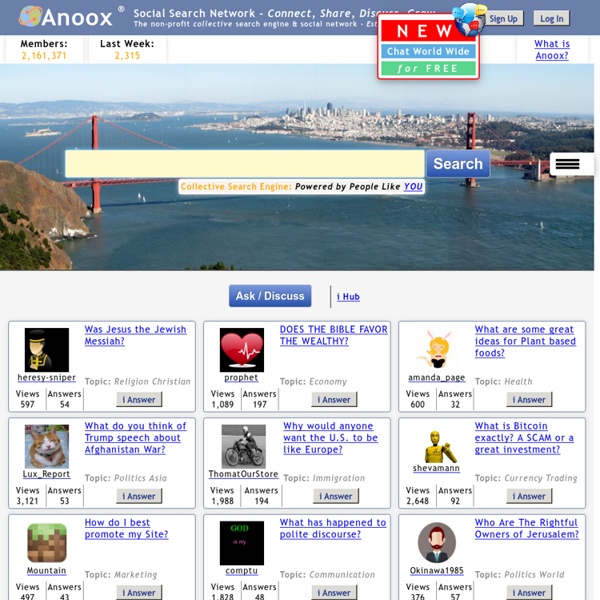



Computational sociology Computational sociology is a branch of sociology that uses computationally intensive methods to analyze and model social phenomena. Using computer simulations, artificial intelligence, complex statistical methods, and analytic approaches like social network analysis, computational sociology develops and tests theories of complex social processes through bottom-up modeling of social interactions.[1] In relevant literature, computational sociology is often related to the study of social complexity.[5] Social complexity concepts such as complex systems, non-linear interconnection among macro and micro process, and emergence, have entered the vocabulary of computational sociology.[6] A practical and well-known example is the construction of a computational model in the form of an "artificial society", by which researchers can analyze the structure of a social system.[2][7] History[edit]
6 Most Powerful Search Engines for Social Networks If you’re like most Internet users, you probably spend a decent amount of time using a search engine to find content and answers to your questions. Based on what you’re searching for, a lot of the top results that come up generally are social networking pages and profiles, especially if you’re searching for a person. But what if you only want to search social networks? Social network search engines are designed to do this. They can filter out all the unnecessary results you might get if you used a regular search engine for your query. Social Media Resources If you're a trainer, educator, librarian or geek, statistics on social media are a must. Here are a few that I've found recently, together with sources. 1) Global Active Internet Users now totals 3.175 Billion, that’s nearly half of the world’s population (7.357 Billion).
Methamphetamine Markets, Personal Relationships, and Families Image: Victor Habbick It is not legal to market methamphetamine in America. There are no agencies regulating sales or setting standards. There are no records of transactions or trends. Topsy - Instant social insight With iOS 9, Search lets you look for content from the web, your contacts, apps, nearby places, and more. Powered by Siri, Search offers suggestions and updates results as you type. There are two ways to use Search on your iOS device. Quick Search Drag down from the middle of the Home screen and type what you're looking for. Search in Archie Welcome to archie.icm.edu.pl Search for: Database: Worldwide Anonymous FTP Polish Web Index Search Type: Sub String Exact Regular Expression Case: Insensitive SensitiveDo you want to look up strings only (no sites returned): NO YESOutput Format For Web Index Search: Keywords Only Excerpts Only Links Only Optional Search Parameters
Letters: Sociologists' offer to unravel the riots One of the first things that disappears when considering disturbances such as these is perspective. One loses sight of the fact that nine out of 10 local residents aren't rioting, that nine out of 10 who are rioting aren't local to the area, and that nine out of 10 of these non-locals aren't doing it to commit crime. That is to say, it is a tiny minority who are participating and, of those that are, it's a tiny minority who are doing so solely to commit crime. Crime is a motive, but crowd behaviour is a more complex process, and it is sociology as a discipline that best understands crowd behaviour. Crowds are irrational. 100 Useful Tips and Tools to Research the Deep Web By Alisa Miller Experts say that typical search engines like Yahoo! and Google only pick up about 1% of the information available on the Internet. The rest of that information is considered to be hidden in the deep web, also referred to as the invisible web. So how can you find all the rest of this information?
Why Russians think Americans don't own their homes University of Arizona sociologist Jane Zavisca says the two countries are polar opposites when it comes to mortgage financing. When the Soviet Union disintegrated in 1991, one of the structural problems the new government and free-market economy had to deal with was housing. Most Russians lived in government-owned apartments that had been built beginning in the late 1950s. The “Reverse Discrimination Sentiment” - Innovations As Peter Schmidt reported in The Chronicle, new research to be presented at the American Educational Research Association next week finds that Americans “see minority students as having much greater advantages in seeking access to college than is actually the case.” The findings appear to suggest that the existence of affirmative action at highly selective institution generates a general (and factually incorrect) sense among whites that minority students are actually more likely to have access to college generally. The findings come from a paper entitled, “The Blind Side: Americans’ Perceptions of Inequalities in College Access,” authored by Indiana University sociology professor Brian Powell and doctoral students Kristin M. Jordan and Oren Pizmony-Levy. The actual data on college access suggest a different story.
Heroes, Presidents, and Politics by Jeffrey C. Alexander In 2008, we needed a hero. We still do.